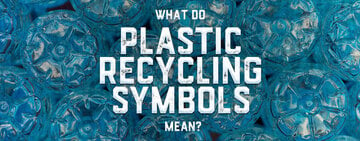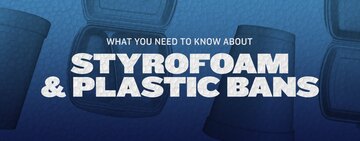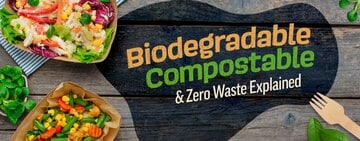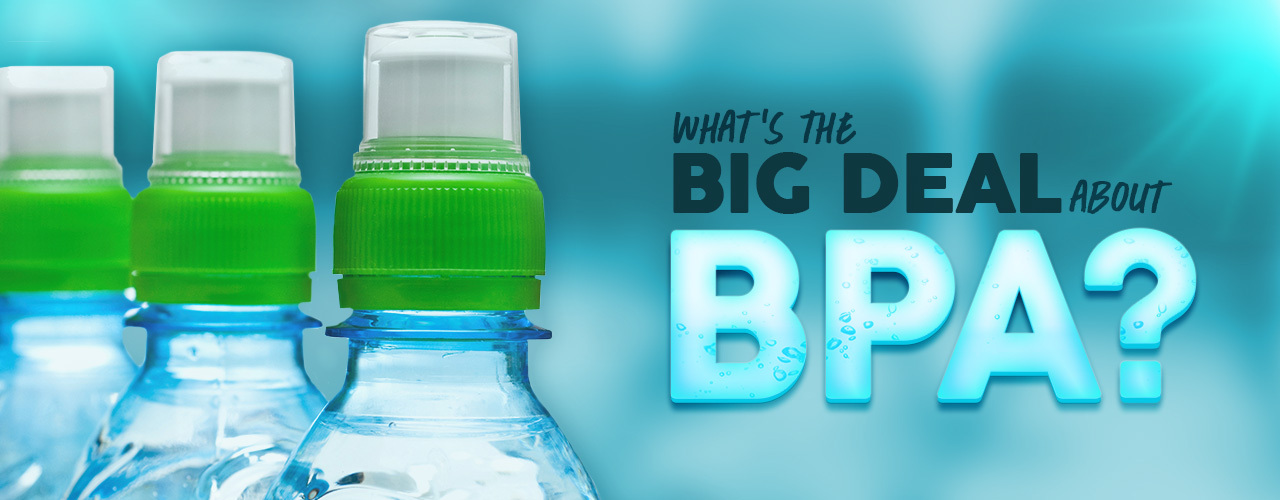Whether you’re ordering new plastic containers for your restaurant kitchen or a new water bottle for personal use, you’ve probably seen products that brag, “BPA Free!” But what is BPA, and is it necessary to avoid it? BPA is short for Bisphenol A, a chemical that’s been used to make polycarbonate plastics and resins since the 1950s. The chemical started to get attention in the 1990s when customers began to ask, "Is BPA safe?" Since then, there have been several studies that have attempted to link BPA to health problems, but the FDA has concluded that a low level of BPA exposure is not harmful to humans. Despite this, the U.S. and Canada have banned baby bottles with BPA to prevent potentially negative effects in children, and many companies are voluntarily phasing out adult water bottles with BPA in order to reassure worried consumers.
What Plastics Contain BPA?
Although a certain amount of BPA is safe for daily human ingestion, consumers should be aware of which plastics contain BPA and other potentially harmful chemicals. Plastic is categorized by resin codes that tell consumers how to recycle the different types of plastic. The recycling number also corresponds to chemicals that the plastic is actually made with. It can be difficult to keep these numbers straight, so this list will help you sort out which plastics are safe for use in a variety of different situations.
Polyethylene Terephthalate

- Contains BPA: No
- Used For: Disposable Water Bottles, Clothing (Polyester)
- Recycled Into: Pillow Filling, Sheet Plastic, Food Containers
High-Density Polyethylene

- Contains BPA: No
- Used For: Milk Containers, Detergent Bottles, Water Jugs
- Recycled Into: Hair Care Bottles, Motor Oil Bottles, Outdoor Fencing, Recycling Bins
Polyvinyl Chloride

- Contains BPA: No, but when heated this plastic can release other chemicals into food
- Used For: PVC Piping, Outdoor Fencing, Medical Tubing, Shrink Wrap
- Recycled Into: Not Commonly Recycled
Low-Density Polyethylene

- Contains BPA: No
- Used For: Bread Bags, Toys, Squeeze Bottles, Adhesives
- Recycled Into: Tile, Paneling, Trash Cans
Polyproplene

- Contains BPA: No
- Used For: Yogurt Containers, Take-out Containers, Bottle Caps, Condiment Bottles
- Recycled Into: Brooms, Car Battery Cases, Storage Bins, Trays
Polystyrene

- Contains BPA: No, but when heated this plastic can release other chemicals into food
- Used For: All Foam Products (Cups, Plates, Bowls, and Packing Peanuts), Coat Hangers, Toys
- Recycled Into: Not Commonly Recycled
Other

- Contains BPA: Plastic 7 may contain BPA. If it is not labeled "BPA Free" it probably contains BPA
- Used For: Large Reusable Water Bottles, Compostable Disposables, Other
- Recycled Into: Not Commonly Recycled
Related Resources

What Do Plastic Recycling Symbols Mean?
Many foodservice businesses are interested in recycling the plastic bags and containers they use to store, prepare, and keep their food fresh. However, it can be difficult to determine what can be recycled and how to properly recycle these materials. Check out the infographic below to learn how plastic recycling numbers and symbols can help you determine how to recycle your waste, potential risks of each plastic, and what these products are recycled into. What Are the Seven Main Plastics? The seven main types of plastic resins are polyethylene terephthalate (PETE), high-density polyethylene (HDPE), polyvinyl chloride (PVC), low-density polyethylene (LDPE), polypropylene (PP), and polystyrene (PS). The seventh category is designated as “other,” which can include polycarbonate resins, acrylic, polyactic fibers, nylon, and fiberglass, just to name a few. Where Did Plastic Recycling Symbols and Numbers Come From? To determine which type of plastic a container is made of, you should look for its Resin Identification Code (RIC), which is the number (between 1 and 7) within the triangular recycling symbol located on each plastic product. This plastic recycling code system was introduced by the Plastics Industry Trade Association (SPI) in 1988 to assist communities that were implementing recycling programs. These recycling numbers will also help you determine if that type of plastic will be accepted by your local recycling programs. If you’re interested in learning more about recycling plastic, check out the infographic below. PETE (Polyethylene Terephthalate) Soda and water bottles, salad dressing containers, and peanut butter jars are typically made out of PETE plastic. It can be recycled into products such as tote bags, furniture, fibers, and pillow stuffing. How to Recycle: Curbside recycling Health and Environmental Risks: Can allow bacteria to accumulate HDPE (High-Density Polyethylene) HDPE plastic can be found in milk jugs, household cleaner containers, cereal box liners, and yogurt containers. It can be recycled into products such as pens, lumber, detergent bottles, and playground equipment. How to Recycle: Curbside recycling Health and Environmental Risks: One of three plastics considered safe due to a lower risk of leaching PVC (Polyvinyl Chloride) PVC plastic can be found in food wrap, plumbing pipes, window cleaner bottles, and detergent bottles. It can be recycled into paneling, flooring, speed bumps, and bubble packaging. How to Recycle: Difficult to recycle; requires mechanical or feedstock recycling Health and Environmental Risks: May contain DEHA, which has been cleared by the FDA for food-contact applications LDPE (Low-Density Polyethylene) LDPE plastic can be found in squeeze bottles, plastic shopping bags, carpets, and food wraps. It can be recycled into compost bins, trash can liners, floor tiles, and shipping envelopes. How to Recycle: Outside recycling facilities Health and Environmental Risks: One of three plastics considered safe due to a lower risk of leaching PP (Polypropylene) PP plastic can be found in products such as straws, ketchup bottles, syrup bottles, and medicine bottles. It can be recycled and made into products such as brooms, bins, pallets, and bicycle racks. How to Recycle: Curbside recycling Health and Environmental Risks: One of three plastics considered safe due to a lower risk of leaching PS (Polystyrene/Styrofoam) PS is found in compact disk cases, egg cartons, meat trays, and disposable dinnerware. It can be recycled into vents, foam packaging, insulation, and egg cartons. How to Recycle: Difficult to recycle; check with your local recycling site for drop-off options or use a mail-in service Health and Environmental Risks: Polystyrene may pose a health risk when heated Miscellaneous Plastics Miscellaneous plastics refers to nylon, styrene, and fiberglass to name a few. It can be found in items such as sunglasses, computer cases, baby bottles, and bulletproof materials. These miscellaneous plastics can be recycled and made into products such as plastic lumber and outdoor signs. How to Recycle: Difficult to recycle Health and Environmental Risks: Polycarbonates may contain BPA, which may be unsafe when consumed in excess

Plastic and Styrofoam Bans
Plastic and styrofoam bans have become increasingly prevalent across the United States in recent years. As a foodservice operator, it's crucial to understand the importance of these bans and how they can impact your business. Complying with these bans can help you avoid potential fines and legal issues. By staying informed and proactive, you can navigate the changing landscape of plastic and foam bans and position your business to become more sustainable. This page has been updated as of January 2024. Because these laws change regularly, readers of this site should be familiar with applicable state laws and restrictions. Shop All Eco-Friendly Disposables Click below to learn more about plastic and styrofoam bans: Styrofoam Bans Styrofoam Alternatives Plastic Bag Bans Plastic Bag Alternatives Plastic Straw Bans Plastic Straw Alternatives Styrofoam Bans Styrofoam, also known as expanded polystyrene foam, is a common material used for takeout containers and cups. Unfortunately, it's slow to break down and can have a significant impact on the environment. Many cities and states have implemented bans on Styrofoam, requiring restaurants to switch to more environmentally friendly alternatives like compostable or recyclable materials. Styrofoam vs Polystyrene Styrofoam is a trademarked name by the Dow Chemical Company to describe their closed-cell extruded polystyrene foam. It is often used interchangeably with the term expanded polystyrene (EPS) foam. Styrofoam and EPS foam are typically used in takeout containers, disposable utensils, and coffee cups. Is Styrofoam Recyclable? Yes, Styrofoam is recyclable at designated recycling centers. The problem is that few recycling centers across the country accept and recycle Styrofoam. If you aren't sure if the product is made from Styrofoam, look for a recyclable symbol with the number "6." Recycling centers that accept #6 plastic typically require the product to be clean and dry when it's dropped off at the facility. Despite being recyclable at some locations, the majority of America’s Styrofoam products are placed in landfills, where polystyrene does not break down. What States Have Banned Styrofoam? The following states have passed state-wide legislation regarding expanded polystyrene products: Colorado Delaware (effective 2025) Maine Maryland New Jersey New York Oregon (effective 2025) Rhode Island (effective 2025) Vermont Virginia (effective July 2028 for large businesses and July 2030 for small businesses) Washington (effective June 2024) Washington, D.C. If you don't see your state on this list, you should still check the polystyrene ordinance in your area. Some states, like California and Hawaii, have passed legislation in at least one city or county. Styrofoam Alternatives If you live in an area currently affected by a Styrofoam ban, there are plenty of alternatives available to keep your takeout service running smoothly. Learn about environmentally friendly alternatives below or start shopping for eco-friendly takeout container options. PET Plastic - Containers made from PET plastic (polyethylene terephthalate) are flexible, lightweight, and recyclable. Many beverage bottles are made from PET because it is clear and resistant to cracking. You can also find PET deli containers that are ideal for packaging takeout items like soups, salads, and sides. PLA Plastic - The unique thing about PLA plastic (polylactic acid) is that it's made from renewable resources like sugar cane, corn starch, or sugar beets. Try using PLA plastic cups in place of styrofoam to-go cups. Paper/Double Poly-Coated Paper - Double poly-coated products combine eco-friendly paper construction with a moisture-resistant coating. Some coated products do contain forever chemicals called PFAS, so look for the "No PFAS Added" label when shopping. Plant Fiber - Plant fiber disposable products are lightweight and commercially compostable at proper processing facilities. Use liquid-resistant and microwave-safe plant fiber disposables to package deliveries and takeout orders. Post-Consumer Paperboard - Have you ever wondered where the paper in your recycling bin ends up? The material used to create post-consumer paperboard products comes from recycled paper fibers. Reusable Polypropylene Containers - Takeout containers made from recyclable polypropylene feature a durable, synthetic resin construction perfect for multiple-use applications. Plastic Bag Bans Many cities and states have implemented bans on plastic bags, requiring businesses to switch to reusable or paper alternatives. These bans aim to reduce the environmental impact of single-use plastic bags, which can take hundreds of years to decompose. As a restaurant owner, consider investing in reusable bags for takeout orders or offering paper bags as an alternative. It's also a good idea to educate your staff and customers about the importance of these bans and provide incentives for customers to bring their own bags. What States Have Banned Plastic Bags? If you live in one of the following states, be aware that your business is affected by state-wide legislation regarding plastic bags: California Colorado Connecticut Delaware Hawaii Maine New Jersey New York Oregon Rhode Island Vermont Virginia (affects state agencies, colleges, and universities only) Washington If you don't see your state on this list, you should still check the plastic bag ordinance in your area. Many states, like Alaska and New Mexico, have passed legislation in at least one city or county. Plastic Bag Alternatives If you're looking for an alternative to single-use plastic bags, there are many options available. Paper Bags - Stock paper bags instead of plastic bags for packaging takeout orders, retail purchases, and groceries. Reusable bags are considered the most environmentally friendly method of packaging goods. Food Boxes - Try skipping the bag altogether and using large takeout boxes with handles to package smaller items. Plastic Straw Bans Plastic straw bans began popping up in Massachusetts in 2015 but didn't hit mainstream news until Seattle became the largest US city to enact a straw ban in 2018. Supporters of plastic straw bans argue that single-use straws have a negative environmental impact, but those opposed to a ban on plastic straws argue that more expensive alternatives will hurt their business’s bottom line. What States Have Banned Plastic Straws? These states have passed state-wide legislation regarding the distribution of single-use straws. In many of these states, straws can still be provided to customers by request only. California Colorado New Jersey Oregon Vermont Virginia (affects state agencies, colleges, and universities only) Washington Washington D.C. If you don't see your state on this list, you should still check the plastic straw ordinance in your area. Some states, like Florida and Georgia, have passed legislation in at least one city or county. Plastic Straw Alternatives If your business currently operates in the affected states above, it may be time to ditch the plastic straws. Thankfully there are many eco-friendly straw alternatives you can use instead of plastic. PLA Plastic Straws - Recyclable straws made from PLA look like plastic, but they're compostable at the appropriate facilities and under the right conditions. PHA Straws - PHA (polyhydroxyalkanoate) is a bio-based material that can be composted at home, which sets it apart from other compostable materials. Straws made from PHA look and feel like plastic but are more sustainable. Paper Straws - Festive paper straws are a colorful option for catered events or special occasions, and they break down easily after use. Reusable Straws - Not only can these straws be washed and reused, but they also provide an upselling opportunity. Try offering eco-friendly reusable straws as an add-on item to your beverage menu. Edible Straws - Edible straws are a fun option for cold beverages like smoothies, milkshakes, and cocktails. They're made from edible materials that break down easily which makes them a great alternative to plastic straws. When it comes to operating your foodservice business, it’s important to stay on top of possible legislative action that may affect your operational costs. Styrofoam and plastic are both big parts of takeout and delivery services, so finding an environmentally friendly option that complies with regulations without compromising your bottom line is imperative.

Biodegradable, Compostable, & Zero Waste Explained
One of the fastest-growing foodservice trends is switching from traditional disposables and foodservice products to eco-friendly options. When searching for eco-friendly products for your restaurant, you may come across the terms "biodegradable", "degradable", and "compostable". We explain the differences between biodegradable, degradable, and compostable products, and how your restaurant can go zero waste with eco-friendly disposables. Biodegradable, Compostable, and Degradable: What's the Difference? Biodegradable, compostable, and degradable products are made from different materials and deteriorate under distinct circumstances. We break down what each material is to help you make an informed decision when buying green disposable dinnerware for your business. What Does Biodegradable Mean? Biodegradable refers to a product breaking down into natural elements, carbon dioxide, and water vapor by organisms like bacteria and fungi. Technically, just about everything is biodegradable, although it will take hundreds of thousands of years for most things to biodegrade. To earn a biodegradable label, products and materials must quickly decompose into natural materials. Third-party certifiers typically restrict acceptable breakdown times between six and nine months. Why Biodegradable Products Shouldn't Go to Landfills While biodegradable products are an eco-friendly option for restaurants, there are some downsides as well. When biodegradable products are dumped into landfills, which happens when they're thrown into the trash, they often get buried. Beneficial bacteria cannot survive buried underneath trash because there is very little oxygen. As a result, the biodegradable products break down anaerobically, meaning without oxygen, which creates methane, a greenhouse gas that is bad for the environment. Some landfills collect the methane produced in their landfills and use it to create electricity, but most do not. How to Dispose of Biodegradable Products Because biodegradable products in landfills can create harmful methane, it is better to dispose of them in a commercial compost heap or to send them to a recycling plant. You can also check if there is a biogas plant in your area, which uses biodegradable products to create methane which they then use to generate electricity. What Is Compostable? Compostable means that a product will break down into natural elements, but only in a compost setting. Compostable materials are typically made from plants and other organic materials, such as cornstarch, bagasse, or PLA plastic. Compostable products have two added benefits over biodegradable options: they break down much faster, many in roughly 90 days, and they also break down into nutrient-rich products, which generate healthy soil for the planet. How to Dispose of Compostable Products For compostable products to break down correctly, they need to be thrown away in a compost heap. Compost heaps are rich in microorganisms and reach high temperatures, which allow products to break down quickly. These types of products do not break down easily in traditional landfills, so compostable products should not be thrown in the trash. While many compostable products mimic the look of plastic, they should not be recycled. Why You Shouldn't Recycle Compostable Products Compostable products are not recyclable, and if a compostable item enters your restaurant's recycling process, it will contaminate and ruin the rest of your batch. If you're using compostable products at your fast food establishment or food truck, you should alert your customers so they can dispose of the products properly. What Does Degradable Mean? Degradable products are mostly oil-based and they break down through chemical reactions rather than organically by microorganisms. Unlike biodegradable products, degradable plastic items can break down in anaerobic environments like landfills. However, degradable products do not break down completely and turn into organic material. Instead, they break apart into microscopic pieces which can still affect the environment. For example, some plastic can degrade and turn into small pieces, which animals ingest, causing major issues in the food chain. It typically takes much longer for products to degrade than it does to take biodegradable or compostable items to break down. What Is Oxo-Degradable Plastic? Oxo-degradable plastic is composed of petroleum-based polymers and additives such as metal salts that expedite their degrading process. In airy, hot, and bright environments, oxo-degradable products break down into small, microplastic pieces in a short amount of time. However, oxo-degradable products are not biodegradable or compostable, and they will not break down to the molecular level. Oxo-Degradable vs Oxo-Biodegradable Oxo-degradable and oxo-biodegradable products are extremely similar, but some oxo-biodegradable products have the potential to break down into natural substances in composting environments and oxo-degradable products do not. We've clearly outlined the similarities and differences between oxo-degradable and oxo-biodegradable products below. Oxo-Degradable and Oxo-Biodegradable Similarities: Both have metal additives that allow them to break down into microplastic pieces without the aid of microorganisms. Both require microorganisms to degrade the microplastic pieces they break down into. Both require UV light and oxygen to disintegrate and won’t break down in landfills where trash items pile up. Oxo-Degradable and Oxo-Biodegradable Differences: Some oxo-biodegradable products have the potential to biodegrade in composting environments and traditional oxo-degradable products do not. What Is Zero Waste? Zero waste is a philosophy that aims to follow sustainable natural cycles where all discarded materials are used for other purposes, resulting in no trash going to landfills or incinerators. The goal of zero waste is not to send products to recycling plants and compost heaps instead of landfills but to use all the products and eliminate waste entirely. While many people across the country choose a zero-waste lifestyle at home, you can also implement some tactics in your restaurant to create a zero-waste kitchen. How to Go Zero Waste The first step in creating a zero-waste kitchen is determining how much food you're currently wasting and how much trash you're producing. From there, you can decide where to make adjustments to limit food waste. One of the best ways to calculate how much food you're wasting is to conduct a food waste audit. To conduct a food waste audit, have your employees track the amount of food that is coming into your restaurant and then how much is being thrown away. This can help you understand if you need to scale back your shipments, change how you're storing produce, or adjust your menu. Another major source of waste in kitchens is disposables like plastic cups, disposable plates, straws, napkins, and packaging. Zero Waste Tips If you're interested in turning your restaurant into a zero-waste kitchen, here are some helpful tips to reduce waste and re-purpose products. Find unique ways to use food scraps in your kitchen, such as using vegetable scraps and skins to make vegetable broth. Donate excess food to local food banks and food scraps to farms to use as animal feed. Use leftover meat and vegetables in soups and stews. Swap out your disposable plates and bowls for melamine or china options. Replace your paper napkins with reusable cloth versions. Eliminate plastic straws. Choose eco-friendly cleaning supplies and chemicals. Take any remaining waste to commercial compost heaps rather than throwing them away. While there are many similarities between biodegradable, compostable, and degradable items in terms of construction and look, they are vastly different and have very different impacts on the environment. If you're looking for disposables that can help you with transitioning your kitchen to zero waste, compostable items are a perfect choice because they're sustainable, they turn into safe organic material, and they break down quickly.
